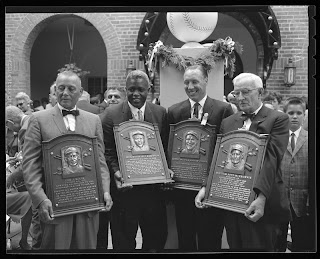

Edd J Roush was born in 1893 in Oakland City, Indiana. His father William was a locally-reknown baseball player as well as a dairy farmer. Undoubtedly the work young Roush did on the farm lead to his strong hands that allowed him to yield a 48-ounce bat throughout his career.
At age 16, the youngster got his chance to play for the local Oakland City semi-pro club when the regular outfielder didn't show. He got a couple of hits, and the job was his. A natural lefty, Roush had learned to throw with his right hand out of a lack of righthanded gloves available to him growing up. Roush played some second base while with Henderson (Ky) in 1911, but gladly went back to the outfield when the chance arose. In 1912, he moved to the Evansville club in 1912, and was having a great season in 1913 when his contract was sold to the Chicago White Sox in August of the year. After a short stint with the Sox, he was farmed out to the minor leagues on September 11, 1913.
During the off-season, dissatisfied with his contract and his prospects with the White Sox, he jumped to the Federal League and signed with Indianapolis. It was a successful move, for he batted .325 in 79 games (and married that April, too). The Indianapolis franchise moved to Newark for the 1915 season, and Roush batted .298 in a full-time capacity. However, the Federal LEague disintegrated that winter, and Roush was sold to the New York Giants. Dissatisfied over his playing time and his hatred for manager John McGraw, Roush was excited when he was traded to the Reds in mid-season with Christy Mathewson. Roush played well for the Reds down the stretch, and he was on the cusp of a fantastic career as a Red.
He won the National League batting title in 1917, missed by two percentage points the following year, but won another one in 1919 when he lead the Reds to the World Championship over the Black Sox. Roush regularly hit over .300 through 1926, and was a spectacular fielder as well.
After the 1926 season, 33-year old Roush was dealt back to the Giants. He threatened retirement over playing for McGraw, but McGraw, who claimed he had been trying to get Roush back since 1917, assured him things would be different this time around. Roush reluctantly agreed, and he hit .304 for New York in 1927. Injuries began to take their toll. His knees were getting worse, and he also missed a lot of 1928 due to abdominal surgery. He sat out the entire 1930 season due to a salary dispute. He returned to the Reds for the 1931 season before calling it quits for good. He had almost 2400 career hits, and a .323 career batting average (.331 with the Reds.)
Roush coached for a year, for the Reds in 1938, but due to a knack for financial investments, Roush was able to enjoy his retirement, unlike so many teammates who had to find new careers. Roush was elected to Baseball's Hall of Fame in 1962, and in 1969, was voted by the Cincinnati Red fans as the greatest Red player in the franchise's history. (But please note the year... the Big Red Machine was just being pieced together.)
Roush split his retirement time between Oakland City and Bradenton, Florida, where he spent his winters for 35 years. On March 21, 1988, Roush made his way to Bill McKechnie Field, where the Texas Rangers and the Pittsburgh Pirates were to play a Grapefruit League game. Roush was a fixture around the park for many years, chatting it up with players, umpires and fans alike. His visits to the clubhouse were always a treat for Roush, as well as the players. However, before the game began, Roush suffered a heart attack, and died at the field. He was 94 years old.
Roush is known as being an independent and hard-nosed player. He never reported to spring training, and was a regular contract hold-out, too. But at the bat, and in centerfield, his skills were better than anyone in the National League. He was also not afraid of a fight, often spiking infielders after their pitcher had thrown one inside too close... so much so that the infielders would demand their hurler not throw too close to Roush.
Roush was also vocal about the 1919 World Series, and insisted to his dying day that the Reds would have beaten the White Sox either way. He also said that everyone on the Reds knew something fishy was up during the series, and one gambler even approached Reds pitcher Hod Eller in an elevator with an offer to throw games. Roush was the last surviving participant of the Series, and in 1987, he even ventured up to Indianapolis where filmmaker John Sayles was directing a movie based on the 1919 Black Sox book, "Eight Men Out." On the set, Roush regaled the actors and crew with old baseball stories, as well as gave some advice on hitting to the actors. Great movie, you should check it out if you haven't seen it yet.
The Autograph: Roush was one of my favorite old-timers. A true gentleman and class act, he replied to every one of my letters, be it from Indiana or Florida. I can still remember my sadness upon hearing of his passing. I was hoping that he would make it another six weeks to his 95th birthday, so he could pass Elmer Flick as the oldest Hall of Famer ever. (Al Lopez later passed Flick in longevity). Roush was also the last surviving player to have played in the Federal League, the last challenge to the supremacy of the AL/NL.

No comments:
Post a Comment